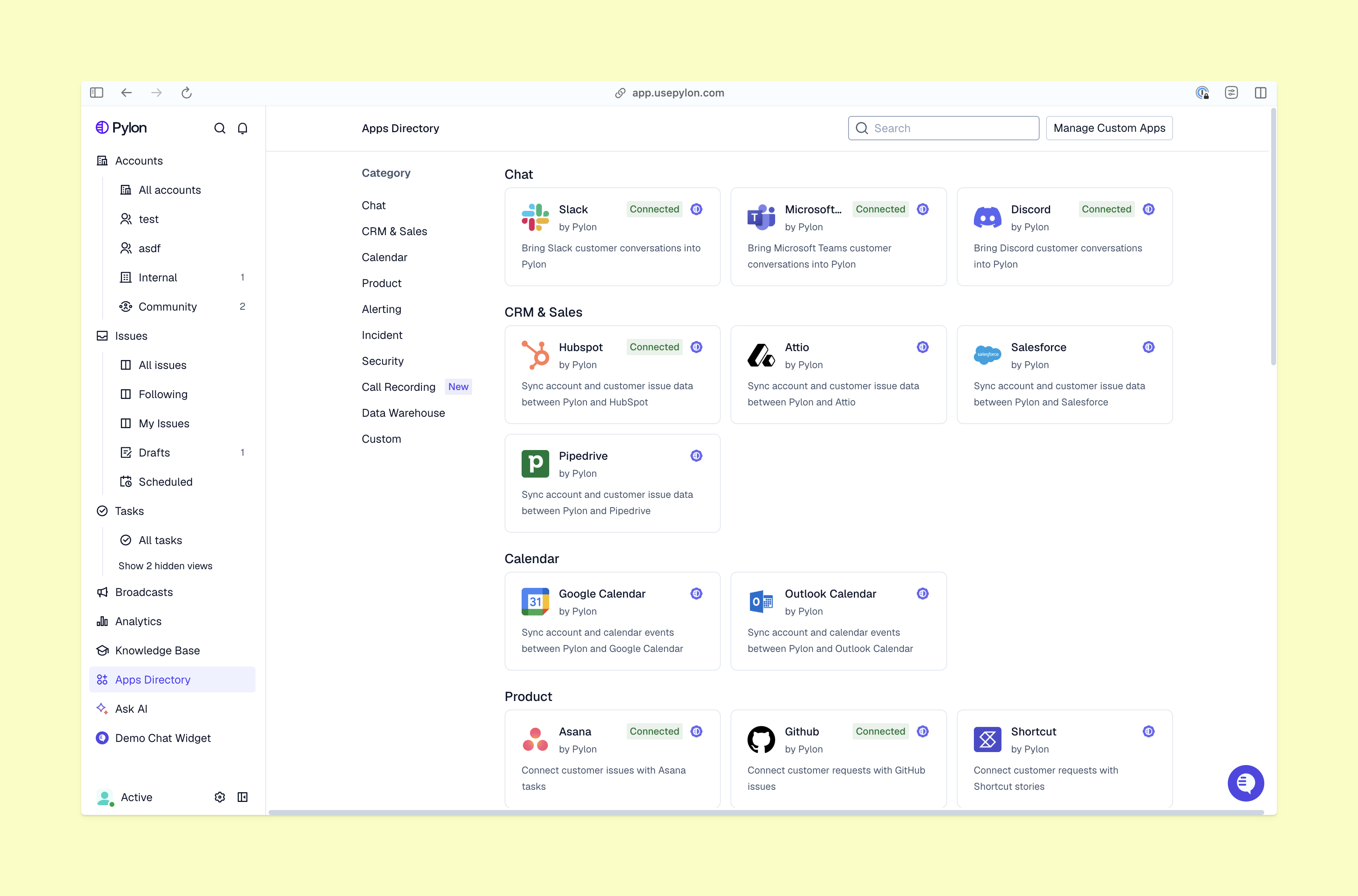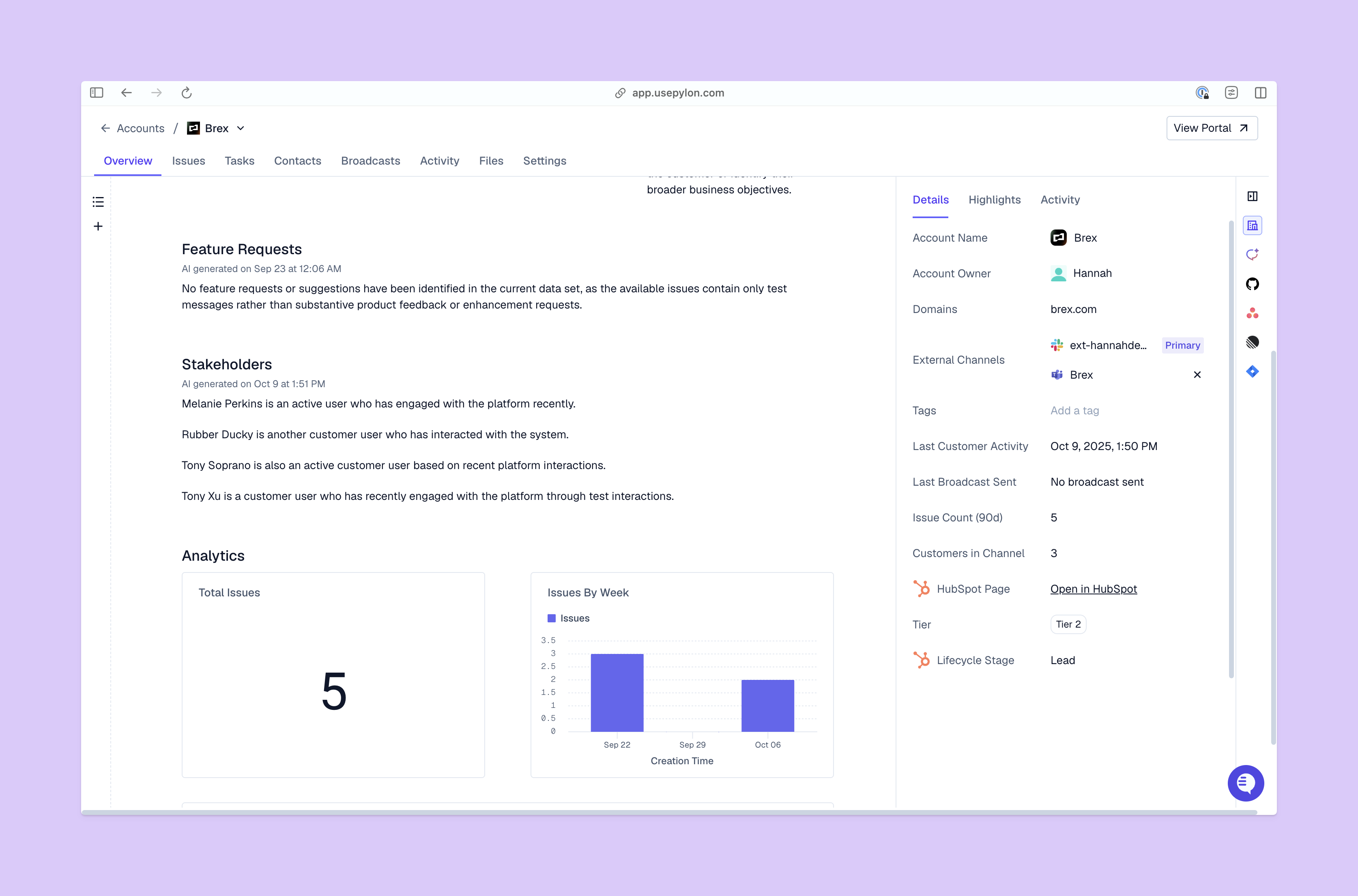How to Choose a B2B Platform That Unifies Support and Success
Fragmented tools create blind spots that cost B2B companies 15-20% in potential revenue growth. When support tickets live separately from customer success workflows and account data, teams miss churn signals, duplicate work, and lose expansion opportunities. Learn how unified platforms give every team member complete customer context to drive retention and revenue.
Updated October 15, 2025 | 23 min read
TL;DR
Modern B2B companies need platforms that break down silos between customer support, account management, and customer success. The right platform combines ticketing, health scoring, automation, and AI to drive retention, identify upsell opportunities, and predict churn—all while giving team members a complete view of the customer journey.
This guide explores how unified platforms transform reactive support into proactive success strategies that directly impact your bottom line.
Why Traditional Support Tools Fall Short for Modern B2B Teams
The customer success landscape has fundamentally changed. According to research from Gartner Peer Insights and Vitally, 77% of executives predict customer success will drive up to 50% of top-line revenue growth. But many B2B teams still operate with fragmented tools that create data silos between support, success, and sales.
When your customer support software lives separately from your CRM, and your customer success platform doesn't talk to your ticketing system, you're missing critical insights that drive retention and expansion revenue.
The cost of this fragmentation is real. Companies lose 15-20% of potential revenue growth when they fail to map, identify, and act on conversion or upsell opportunities across the customer journey. Meanwhile, your competitors using unified platforms are moving faster, predicting churn earlier, and closing expansion deals before you even spot the opportunity.
The Business Case for Unified B2B Platforms
Revenue Impact You Can Measure
The numbers tell a compelling story about integrated customer platforms:
- 5% improvement in retention = up to 95% increase in profit (Bain & Company)
- It's 5-25x more expensive to acquire new customers than retain existing ones (Harvard Business Review)
- 60-70% success rate selling to existing customers vs. 5-20% for new prospects (Invesp)
- Companies with mature CS strategies report bigger deals, increased NRR, higher team growth, and lower CSM load (ChurnZero Customer Success Leadership Study)
When support interactions directly inform customer health scores and success teams can see every ticket in context, you create a cycle where every customer touchpoint becomes an opportunity to strengthen the relationship and identify growth potential.
The Hidden Cost of Disconnected Systems
Support teams fielding tickets in isolation miss critical context about account health, contract value, and expansion potential. Success teams reviewing product usage data don't see the support friction that's quietly eroding customer satisfaction. Teams pursuing upsells lack visibility into unresolved issues that could torpedo the deal.
This disconnection leads to:
- Missed churn signals until it's too late to save the account
- Duplicate work across teams asking customers the same questions
- Lost upsell opportunities because teams don't coordinate on account strategy
- Inconsistent customer experiences that damage trust and loyalty
B2B customer service best practices require breaking down these silos and creating a single source of truth for customer data.
What Makes a Platform Truly Unified?

The best B2B platforms don't just connect tools—they fundamentally rethink how customer-facing teams collaborate. Here's what to look for:
1. Shared Customer Context Across All Teams
Every team member should see the complete customer story in one place:
- Full conversation history across channels (email, Slack, Discord, Microsoft Teams, in-app chat)
- Support ticket status and resolution history
- Product usage patterns and adoption metrics
- Contract details, renewal dates, and expansion opportunities
- Customer health scores and risk indicators
- Account hierarchy and stakeholder relationships
Pylon's Account Intelligence automatically surfaces this context, so support teams know whether they're talking to a power user at a high-value account or helping someone at risk of churn.
2. AI-Powered Health Scoring That Actually Predicts Risk
Traditional health scoring relies on manual data entry and static formulas. Modern platforms use AI to:
- Analyze sentiment in every customer interaction, detecting frustration or satisfaction before it shows up in surveys
- Track engagement patterns over time, recognizing subtle shifts that signal disengagement
- Predict churn probability by combining product usage, support interactions, survey responses, and communication frequency
- Generate relationship scores that provide at-a-glance health status for each account and contact
AI health scoring moves teams from reactive firefighting to proactive relationship management. Customer success managers can prioritize outreach based on real risk, while support teams understand which tickets need extra attention because the account is at risk.
AI-powered customer support isn't just about deflecting tickets—it's about using customer intelligence to drive retention strategy.
3. Conversational Workflows That Connect Teams
Modern B2B customers expect support where they already work—in Slack channels, Discord servers, or email. The best unified platforms support omnichannel customer service while maintaining a single conversation thread that follows the customer across channels.
When a customer asks a question in Slack, gets follow-up support via email, and then jumps on a call with their CSM, every team member should see the complete conversation history without toggling between systems.
Pylon's conversational ticketing approach maintains context across channels while automatically capturing everything in your system of record.
4. Automation That Scales Personalized Engagement
Manual outreach doesn't scale. The best platforms use intelligent automation to:
- Trigger proactive notifications when health scores drop or milestones are missed
- Route tickets to the right team based on account value, risk level, and expertise needed
- Schedule check-ins at critical moments in the customer journey
- Flag upsell opportunities when usage patterns indicate a potential for expansion
But automation should enhance, not replace, human judgment. Look for platforms that surface insights and suggest actions while keeping teams in the driver's seat for strategic decisions.
5. Seamless Integration with Your Existing Stack
A truly unified platform connects with the tools you already use:
- CRM systems (Salesforce, HubSpot, Attio) for account and deal data
- Product analytics (Mixpanel, Amplitude, Heap) for usage insights
- Data warehouses (Snowflake, BigQuery) for custom reporting
- Communication tools (Slack, Teams, Discord) for where customers already are
- Knowledge bases for self-service support content
The platform should serve as the hub where all customer data comes together, not another silo requiring manual data entry or lots of custom integrations.
How Support Drives Customer Success and Revenue Growth
Support interactions aren't just about solving problems. They're crucial customer intelligence for customer success and revenue teams.
Every Ticket Tells a Story
A frustrated customer submitting their third ticket about the same feature isn't just a support issue. It's a churn risk signal and an opportunity for product feedback. When customer success teams see these patterns in real-time, they can:
- Intervene proactively with additional training or workarounds
- Escalate feedback to product teams for prioritization
- Identify expansion blockers that need resolution before renewal discussions
- Spot feature gaps that could become competitive vulnerabilities
From Support Tickets to Upsell Opportunities
Support conversations reveal customer needs before formal expansion discussions begin. When a customer asks "Can your platform do X?" or "We're trying to accomplish Y,” those are buying signals.
A unified platform helps you:
- Identify accounts ready for feature upgrades or seat expansion
- Coordinate messaging between support and success to avoid awkward handoffs
- Track product adoption that indicates readiness for advanced capabilities
- Time expansion conversations when customers are seeing maximum value
Research shows upselling works best when positioned as problem-solving rather than selling. Support teams naturally uncover these opportunities, but only if the platform connects those insights to your success team.
Support Quality as a Competitive Differentiator
In crowded B2B markets, exceptional support becomes the moat that keeps customers loyal. Companies taking a proactive support approach see 9% higher scores on customer value enhancement (Gartner).
But proactive support requires systems that enable it. You can't reach out before customers have problems if you don't have:
- Real-time visibility into product usage and adoption
- Automated alerts when customers get stuck or disengage
- Historical context showing what typically causes friction
Customer service software that integrates with success workflows makes proactive support scalable, not just aspirational.
AI's Role in Predictive Customer Success
Artificial intelligence has gone from a buzzword to a business-critical tool. SaaS Capital's 2025 benchmarking report found that 66-70% of SaaS companies now use AI in day-to-day operations—and early adopters maintain a significant competitive advantage.
Sentiment Analysis That Detects Hidden Dissatisfaction
Not every unhappy customer complains explicitly. AI sentiment analysis reads between the lines to detect frustration, confusion, or disengagement in:
- Email communications
- Chat messages
- Support ticket descriptions
- Survey responses
- Slack or Discord conversations
When sentiment trends negative over time, AI flags the account for customer success attention before the customer explicitly considers leaving.
Automated Health Scoring That Adapts
Traditional health scores use static formulas that quickly become outdated. AI-powered scoring continuously learns from:
- Which behaviors correlate with renewals vs. churn in your specific customer base
- How support interaction patterns differ between growing accounts and at-risk accounts
- What usage thresholds indicate successful adoption for different customer segments
- Which sentiment shifts predict problems vs. normal fluctuation
This adaptive approach means your health scores get more accurate over time rather than stale and unreliable.
Predictive Analytics for Proactive Intervention
The most valuable AI capability is predicting what happens next. Modern platforms analyze patterns to forecast:
- Churn risk weeks or months before renewal
- Expansion readiness based on usage patterns and engagement
- Support volume spikes that require staffing adjustments
- Onboarding delays that need CSM intervention
Predictive insights transform customer success from reactive to strategic. Instead of responding to problems, teams get ahead of them.
Pylon's AI-Powered Intelligence
You can use Pylon’s Account Intelligence to automatically:
- Calculate account health based on support interactions, usage patterns, and engagement metrics
- Detect sentiment shifts in customer communications across channels
- Flag at-risk accounts before they submit cancellation requests
- Proactively create tasks for success and support teams
Learn more about Pylon's Account Intelligence features.
Building Your Unified Platform Strategy
Transitioning from fragmented tools to a unified platform requires thoughtful planning. Here's how successful B2B teams approach it:
Start with Your Ideal Customer Journey
Map the complete lifecycle from first contact through renewal and expansion:
- What touchpoints matter most at each stage?
- Where do customers typically get stuck or disengage?
- When should support hand off to success, and vice versa?
- What data needs to be visible to which teams at each milestone?
Your platform should support this ideal journey, not force you to adapt to its limitations.
Prioritize Integration Over Migration
You don't need to rip and replace everything. The best approach:
- Start with your support foundation: Implement unified ticketing that works across channels
- Connect your CRM: Ensure account data flows both directions
- Layer in success workflows: Add health scoring, journey automation, and proactive engagement
- Expand your knowledge base: Enable self-service while capturing intelligence
- Add advanced AI: Implement predictive analytics once foundational data is clean
This phased approach minimizes disruption while steadily improving your capabilities.
Invest in Change Management
Technology alone doesn't transform teams—process and culture do. Plan for:
- Cross-functional training so everyone understands shared workflows
- Clear ownership of metrics and accounts to avoid confusion
- Regular retrospectives to refine processes based on what's working
- Executive sponsorship to maintain focus through the transition
The most successful implementations treat the platform as enabling organizational change, not just replacing software.
Essential Features for a Unified B2B Platform
When evaluating platforms, ensure they provide:
Core Support Capabilities
- Omnichannel ticketing (email, Slack, Discord, Teams, in-app chat)
- Shared inbox for team collaboration
- SLA tracking and automated escalation
- Knowledge base management
- AI-powered triage and routing
- Conversation history maintained across channels
Account Management Features
- 360-degree customer view with all conversational context
- Custom account fields
- Automated health score calculations with AI
- Contract tracking with renewal alerts
- Usage analytics and adoption monitoring
Customer Success Workflows
- Proactive outreach campaigns
- Playbooks for common scenarios
- Success milestones and task tracking
- Churn risk identification and alerts
Collaboration Tools
- Internal notes and @mentions
- Ticket assignment with workload balancing
- Shared macros and templates
- Cross-team visibility into account status
Analytics and Reporting
- Real-time dashboards for key metrics
- Custom reports with flexible filtering
- Trend analysis over time
- Team performance tracking
Integration Ecosystem
- Native integrations with major CRMs
- API for custom connections
- Data warehouse syncing
- Communication platform connectors
- Single sign-on and security compliance
Pylon provides all these capabilities in a platform purpose-built for B2B teams. Explore how Pylon unifies support and success.
Real-World Impact: What Changes When You Unify
Faster Response Times
When support teams have complete context about account value, contract status, and previous interactions, they resolve issues faster. They don’t need to search multiple systems or ask customers to repeat information they've already shared.
Better Retention Rates
84% of unified platform users report increased customer satisfaction scores, while 83% experience improved retention rates (HubSpot Service Hub data). When teams coordinate around customer health, fewer accounts slip through the cracks.
More Expansion Revenue
Support interactions reveal expansion opportunities organically. When success teams see these signals in real-time and can act on them, expansion becomes a natural part of the customer journey rather than an awkward sales pitch.
Higher Team Productivity
Customer success managers spend significant time on repetitive administrative tasks. Unified platforms with automation and AI reduce this burden, letting teams focus on high-value customer interactions.
Improved Cross-Team Collaboration
Breaking down silos changes how teams work together. When everyone has visibility into the complete customer story, collaboration becomes natural rather than requiring constant status updates and handoffs.
Choosing the Right Platform for Your Team

Questions to Ask During Evaluation
For Support Teams:
- How does the platform handle omnichannel conversations?
- Can we maintain context when customers switch channels?
- Can AI agents deflect routine questions?
- How does knowledge base management work?
- Can we customize workflows for different customer segments?
For Success Teams:
- How are health scores calculated and customized?
- What automation triggers can we set up?
- Can we track journey milestones and goals?
- How do we coordinate with support on at-risk accounts?
- What expansion indicators does the platform surface?
For Leadership:
- What metrics can we track in real-time?
- How does pricing scale with our growth?
- What's the implementation timeline and support?
- How secure is customer data?
- What's the total cost of ownership vs. our current stack?
Red Flags to Watch For
- Complex implementations requiring extensive consulting
- Rigid workflows that don't match your processes
- Limited integration options forcing manual data entry
- AI features that are vaporware rather than production-ready
- Pricing that explodes with reasonable usage growth
Why B2B Teams Choose Pylon
Pylon was built specifically for B2B companies that need support and success unified in one platform:
- Native channel integrations for Slack, Discord, Teams, and email
- Account Intelligence that helps you spot churn risks and calculate health scores
- Conversational workflows that maintain context across channels
- Transparent pricing that scales with your business
See how Pylon compares to legacy tools or book a demo.
The Future of Unified Customer Platforms
The evolution toward unified platforms will keep accelerating as AI matures and customer expectations rise. Emerging trends include:
Autonomous AI Agents
Beyond chatbots that deflect simple questions, AI agents will handle complex multi-step workflows: researching issues, handing off to support teams, and executing solutions with minimal supervision.
Real-Time Collaboration Intelligence
AI will suggest optimal times for outreach, predict meeting outcomes, and recommend talking points based on customer sentiment and account context.
Unified Data Platforms
The line between support, success, and analytics platforms will blur as data warehouses become the foundation for all customer tools, with specialized interfaces for different roles.
The companies that thrive will be those that embrace unified platforms early, using integrated data and AI to create customer experiences their competitors can't match with fragmented tools.
Getting Started: Your Next Steps
Ready to move from fragmented tools to a unified platform? Here's your roadmap:
- Audit your current state: Document all customer touchpoints and data sources
- Map your ideal journey: Define how teams should collaborate at each stage
- Identify your must-haves: List features that solve your biggest pain points
- Evaluate 3-5 platforms: Focus on those built for B2B workflows
- Do a trial: Test with a subset of accounts before full rollout
- Measure results: Track impact on retention, expansion, and team efficiency
- Iterate and expand: Refine processes based on what you learn
The transition to unified platforms isn't just a technology shift. It's an organizational evolution toward customer-centric operations where every team contributes to retention and growth.
Frequently Asked Questions
Q: What's the difference between a help desk and a unified customer success platform?
A: Traditional help desks focus solely on resolving support tickets. Unified customer success platforms combine ticketing with account management, health scoring, success workflows, and analytics—giving every team visibility into the complete customer story. While help desks are reactive, unified platforms enable proactive customer success.
Q: How does AI improve customer health scoring compared to manual approaches?
A: AI analyzes thousands of data points across support interactions, product usage, and communication patterns to detect subtle risk signals humans might miss. It continuously learns which behaviors correlate with churn or expansion in your specific customer base, making predictions more accurate over time. Manual scoring relies on static formulas that quickly become outdated.
Q: Can small B2B teams benefit from unified platforms, or are they only for enterprises?
A: Unified platforms are especially valuable for small teams that can't afford specialized roles for support, success, and account management. When one person wears multiple hats, having all customer data in one place becomes critical. Many platforms like Pylon offer flexible pricing that scales with team size.
Q: How do unified platforms handle multiple communication channels without creating chaos?
A: The best platforms use conversational ticketing that maintains a single conversation thread even as customers switch between email, Slack, Discord, or in-app chat. All messages are captured in one timeline with complete context, preventing duplicate work and inconsistent responses.
Q: What role should support teams play in identifying upsell opportunities?
A: Support teams are often the first to hear when customers need additional capabilities or are experiencing growth that requires more capacity. In unified platforms, support teams can flag these opportunities without awkward handoffs to customer success. The key is creating workflows where support surfaces the insight, and success teams follow up with appropriate timing.
Q: How long does it typically take to implement a unified customer platform?
A: Implementation timelines vary based on your tech stack complexity and change management needs. The key is phased rollout: start with core support, then layer in success features rather than attempting everything at once.
Q: What metrics should we track to measure the ROI of a unified platform?
A: Focus on metrics that span support and success: Net Revenue Retention (NRR), time to resolution, customer health score accuracy, expansion pipeline influenced by support, percentage of proactive vs. reactive outreach, support ticket reduction from self-service, and team productivity gains. The best ROI comes from increased retention and expansion revenue.
Q: How do unified platforms maintain data security and compliance?
A: Enterprise-grade platforms offer SOC 2 compliance, data encryption, role-based access controls, audit logging, and data residency options. When evaluating platforms, ask about their security certifications, compliance with regulations relevant to your industry (GDPR, HIPAA, etc.), and how they handle data privacy across integrations.
Q: Can we continue using our existing CRM with a unified customer platform?
A: Yes. The best unified platforms integrate bidirectionally with major CRMs like Salesforce, HubSpot, and Attio. Customer data flows both ways so your CRM remains the system of record for account information while the unified platform adds support interactions, health scores, and success activities to the complete picture.
Q: What happens when multiple team members need to work on the same customer issue?
A: Unified platforms provide collaboration features like internal notes, @mentions, shared ticket ownership, and real-time updates so multiple team members can coordinate seamlessly. When a support agent needs CSM input or a success manager needs technical support backup, everyone works from the same information without switching systems.
Take the Next Step Toward Unified Customer Operations
The question isn't whether to unify your customer-facing platforms, it's when. Every day you operate with fragmented systems, you're missing opportunities to catch churn risks, identify expansion, and deliver the proactive support customers need.
Pylon is the modern B2B support platform that offers true omnichannel support across Slack, Teams, email, chat, ticket forms, and more. Our AI Agents & Assistants automate busywork and reduce response times. Plus, with Account Intelligence that unifies scattered customer signals to calculate health scores and identify churn risk, we're built for customer success at scale.











